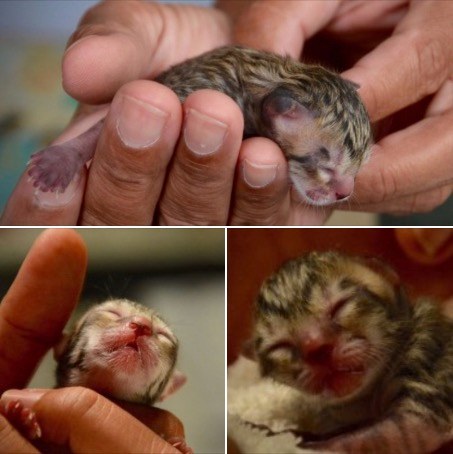In 2016, a heartwarming and remarkable story unfolded on the streets of Thailand that captured the attention of animal lovers everywhere. One evening, while a family was enjoying their quiet time in the neighborhood, they noticed a tiny kitten wandering all alone. The little creature appeared to be abandoned, and naturally, their instincts kicked in.

Concerned for the kitten’s well-being, the family took a closer look and quickly realized something was different. This wasn’t an ordinary house cat. The kitten’s appearance, from its fur pattern to its behavior, didn’t resemble any domestic feline they’d ever seen. Unsure of what kind of animal they were dealing with, the family contacted The Wildlife Friends Foundation Thailand (WFFT), a reputable animal organization dedicated to rescuing and protecting wildlife in the region. The organization promptly responded and sent a team to examine the unusual kitten.

After a thorough inspection, the experts at WFFT made a surprising discovery — this tiny feline wasn’t a typical stray. It was actually a fishing cat, a rare and endangered species native to South and Southeast Asia. These wild cats are known for their affinity for water and, as their name suggests, their remarkable ability to catch and eat fish. A fishing cat can grow to be nearly twice the size of a regular domestic cat and is specially adapted for a semi-aquatic lifestyle. According to information from Wikipedia, the fishing cat (Prionailurus viverrinus) is listed as Vulnerable on the IUCN Red List as of 2016. The species faces serious threats due to the destruction of wetlands, their natural habitat.
These elusive cats typically dwell near rivers, lakes, swamps, mangroves, and other wetland environments, making them increasingly vulnerable as these ecosystems disappear. The experts at WFFT were stunned to find that this particular kitten had likely been born only hours before being discovered. It was incredibly rare, and deeply concerning, for a mother fishing cat to abandon her newborn. This unusual behavior left the rescue team puzzled, but the immediate concern was making sure the baby survived.

The family that had found the kitten had already grown attached to him and, with WFFT’s approval, were allowed to care for him temporarily. They named him Simba, a fitting name for such a strong and special animal. Simba seemed to bond closely with his newfound human family, and they hoped his biological mother might return. They watched constantly, hoping to see her nearby, but she never came back. With no sign of his real mother, the family took on the responsibility of caring for Simba themselves. They fed him milk, nurtured him, and made sure he was growing strong and healthy. As time went on, Simba developed into a beautiful young fishing cat.
His growth and survival were nothing short of a miracle. According to WFFT, fishing cats in Thailand suffer from a staggering 84% mortality rate, primarily due to poaching and retaliatory killings. That means Simba’s very survival is not just a feel-good story — it’s a beacon of hope for the preservation of his endangered species. Each life saved matters immensely when a population is so close to collapse. Simba’s rescue stands as a powerful reminder of the importance of protecting all forms of wildlife.
Every animal, big or small, plays a role in maintaining the delicate balance of nature. While Simba may have started his life in a fragile state, his continued well-being offers a glimmer of hope for fishing cats everywhere. Stories like this show that with a little compassion, attention, and effort, we can make a real difference. And while Simba’s story is extraordinary, it’s worth noting that countless other animals are rescued every year and deserve the same chance to live. Though not every cat will be a rare fishing cat, each life is precious.
Sharing stories like Simba’s can help raise awareness and remind us all of the vital role animals play in our world. If you believe in the value of every creature and the importance of protecting wildlife, consider sharing this inspiring story. Together, we can help ensure that special animals like Simba continue to thrive for generations to come.





